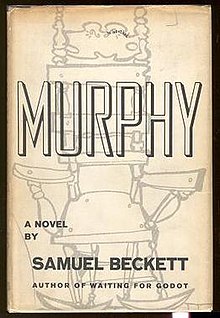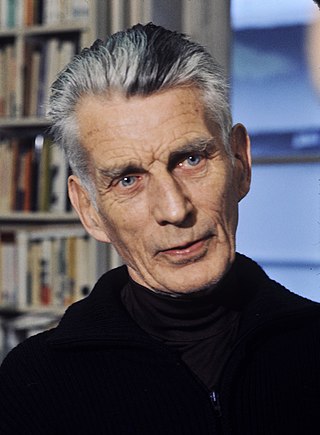
Samuel Barclay Beckett was an Irish novelist, dramatist, short story writer, theatre director, poet, and literary translator. His literary and theatrical work features bleak, impersonal, and tragicomic experiences of life, often coupled with black comedy and nonsense. His work became increasingly minimalist as his career progressed, involving more aesthetic and linguistic experimentation, with techniques of stream of consciousness repetition and self-reference. He is considered one of the last modernist writers, and one of the key figures in what Martin Esslin called the Theatre of the Absurd.
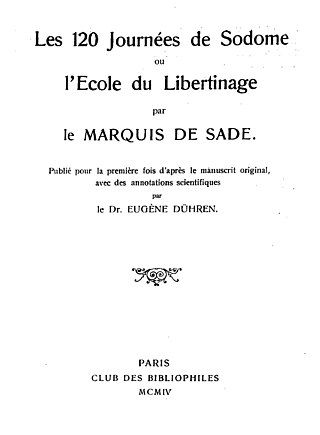
The 120 Days of Sodom, or the School of Libertinage is an unfinished novel by the French writer and nobleman Donatien Alphonse François, Marquis de Sade, written in 1785 and published in 1904 after its manuscript was rediscovered. It describes the activities of four wealthy libertine Frenchmen who spend four months seeking the ultimate sexual gratification through orgies, sealing themselves in an inaccessible castle in the heart of the Black Forest with 12 accomplices, 20 designated victims and 10 servants. Four aging prostitutes relate stories of their most memorable clients whose sexual practices involved 600 "passions" including coprophilia, necrophilia, bestiality, incest, rape, and child sexual abuse. The stories inspire the libertines to engage in acts of increasing violence leading to the torture and murder of their victims, most of whom are adolescents and young women.

Krapp's Last Tape is a 1958 one-act play, in English, by Samuel Beckett. With a cast of one man, it was written for Northern Irish actor Patrick Magee and first titled "Magee monologue". It was inspired by Beckett's experience of listening to Magee reading extracts from Molloy and From an Abandoned Work on the BBC Third Programme in December 1957.
Endgame, by Samuel Beckett, is an absurdist, tragicomic one-act play about a blind, paralyzed, domineering elderly man, his geriatric parents and his doddering, dithering, harried, servile companion in an abandoned house in a post-apocalyptic wasteland, who mention they are awaiting some unspecified "end" which seems to be the end of their relationship, death, and the end of the actual play itself. Much of the play's content consists of terse, back and forth dialogue between the characters reminiscent of bantering, along with trivial stage actions; the plot is held together by the development of a grotesque story-within-a-story that the character Hamm is relating. An aesthetically profound part of the play is the way the story-within-story and the actual play come to an end at roughly the same time. The play's title refers to chess and frames the characters as acting out a losing battle with each other or their fate.

By the Pricking of My Thumbs is a work of detective fiction by Agatha Christie and first published in the UK by the Collins Crime Club in November 1968 and in the US by Dodd, Mead and Company later in the same year. The UK edition retailed at twenty-one shillings (21/-) and the US edition at $4.95. It features her detectives Tommy and Tuppence Beresford.
Not I is a short dramatic monologue written in 1972 by Samuel Beckett which was premiered at the "Samuel Beckett Festival" by the Repertory Theater of Lincoln Center, New York.
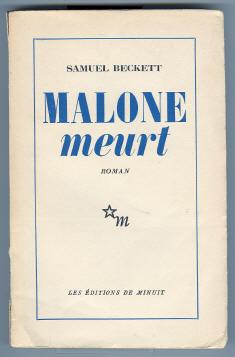
Malone Dies is a novel by Samuel Beckett. It was first published in 1951, in French, as Malone meurt, and later translated into English by the author.

Molloy is a novel by Samuel Beckett first written in French and published by Paris-based Les Éditions de Minuit in 1951. The English translation, published in 1955, is by Beckett and Patrick Bowles.

Belacqua is a minor character in Dante Alighieri's Purgatorio, Canto IV. He is considered the epitome of indolence and laziness, but he is nonetheless saved from the punishment of Hell in Inferno and often viewed as a comic element in the poem for his wit. The relevance of Belacqua is also driven by Samuel Beckett's strong interest in this character.

Eh Joe is a piece for television, written in English by Samuel Beckett, his first work for the medium. It was begun on the author's fifty-ninth birthday, 13 April 1965, and completed by 1 May. "It [was] followed by six undated typescripts .”

Dogsbody is a 1975 children's novel by British writer Diana Wynne Jones, first published by Macmillan. It tells the story of Sirius, a star who is forced to live in the body of a dog on Earth. The book was Wynne Jones' fifth full-length novel.

More Pricks Than Kicks is a collection of short prose by Samuel Beckett, first published in 1934. It contains extracts from his earlier novel, Dream of Fair to Middling Women, as well as other short stories.

Watt was Samuel Beckett's second published novel in English. It was largely written on the run in the South of France during the Second World War and was first published by Maurice Girodias's Olympia Press in 1953.

Mercier and Camier is a novel by Samuel Beckett that was written in 1946, but remained unpublished until 1970. Appearing immediately before his celebrated "trilogy" of Molloy, Malone Dies and The Unnamable, Mercier et Camier was Beckett's first attempt at extended prose fiction in French. Beckett refused to publish it in its original French until 1970, and while an English translation by Beckett himself was published in 1974, the author had made substantial alterations to and deletions from the original text while "reshaping" it from French to English.

Dream of Fair to Middling Women is Samuel Beckett’s first novel. Written in English "in a matter of weeks" in 1932 when Beckett was only 26 and living in Paris, the clearly autobiographical novel was rejected by publishers and shelved by the author. The novel was eventually published in 1992, three years after the author's death.
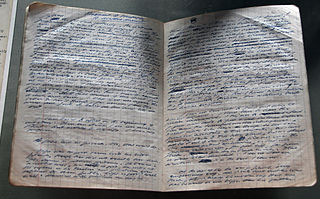
Embers is a radio play by Samuel Beckett. It was written in English in 1957. First broadcast on the BBC Third Programme on 24 June 1959, the play won the RAI prize at the Prix Italia awards later that year. Donald McWhinnie directed Jack MacGowran – for whom the play was specially written – as "Henry", Kathleen Michael as "Ada" and Patrick Magee as "Riding Master" and "Music Master". The play was translated into French by Beckett himself and Robert Pinget as Cendres and was published in 1959 by Les Éditions de Minuit. The first stage production was by the French Graduate Circle of Edinburgh, Edinburgh Festival, 1977."
Rough for Radio I is a short radio play by Samuel Beckett, written in French in 1961 and first published in Minuit 5 in September 1973 as Esquisse radiophonique. Its first English publication as Sketch for Radio Play was in Stereo Headphones 7. It first appeared under its current title in Ends and Odds.

All That Fall is a one-act radio play by Samuel Beckett produced following a request from the BBC. It was written in English and completed in September 1956. The autograph copy is titled Lovely Day for the Races. It was published in French, in a translation by Robert Pinget revised by Beckett himself, as Tous ceux qui tombent.
Ghost Trio is a television play, written in English by Samuel Beckett. It was written in 1975, taped in October 1976 and the first broadcast was on BBC2 on 17 April 1977 as part of The Lively Arts programme Beckett himself entitled Shades. Donald McWhinnie directed with Ronald Pickup and Billie Whitelaw. The play's original title was to be Tryst. "On Beckett’s notebook, the word was crossed out vigorously and the new title Ghost Trio written next to it. On the title page of the BBC script the same handwritten title change can be found, indicating that it must have been corrected at the very last minute."

‘Echo's Bones’ is a short story by Samuel Beckett that was originally written in 1933. The Europa Press published a stand alone version of the story in 1935. This edition included 25 copies signed by Becket.
